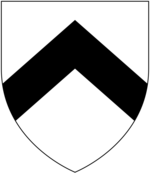Sir John Trelawny, 4th Baronet

Sir John Trelawny, 4th Baronet (26 July 1691 – 2 February 1756), of Trelawne in Cornwall, was a Cornish politician who sat in the House of Commons from 1713 to 1734. Trelawny was the eldest son of Sir Jonathan Trelawny, 3rd Baronet and his wife Rebecca Hele, daughter of Thomas Hele of Bascombe, Devon. His father was Bishop of Bristol, Bishop of Exeter and Bishop of Winchester. He matriculated at Christ Church, Oxford on 26 January 1708.[2] He married Agnes Blackwood daughter of Thomas Blackwood of Scotland. He succeeded his father in the baronetcy on 19 July 1721.[3]

The Trelawny family had extensive political interest in Cornwall. Trelawny entered Parliament at a by-election on 20 April 1713 as Member of Parliament for West Looe, a family seat, and was returned at the 1713 general election soon after. He was appointed Groom of the bedchamber to the Prince of Wales in 1714.[4] In 1715 he was returned unopposed as MP for Liskeard. He was appointed Recorder of East Looe in about 1721 and retained the position until 1734. He was returned unopposed as MP for West Looe again in 1722 and then for East Looe at the 1727 general election. He did not stand in 1734.[5]
Trelawny had no children, and his younger brother, Edward Trelawny, Governor of Jamaica, died before him. He was therefore succeeded in the baronetcy by his cousin, Harry.[3]
References
[edit]- ^ Kidd, Charles, Debrett's peerage & Baronetage 2015 Edition, London, 2015, p.B796
- ^ Foster, Joseph. "Tracie-Tyson in Alumni Oxonienses 1500-1714 pp. 1501-1528". British History Online. Retrieved 3 December 2018.
- ^ a b Cokayne, George Edward, ed. (1902), Complete Baronetage volume 2 (1625–1649), Exeter: William Pollard and Co, p. 43, retrieved 14 November 2018
- ^ "TRELAWNY, John II (1691–1756), of Trelawne, nr. Looe, Cornw". History of Parliament Online (1690–1715). Retrieved 14 November 2018.
- ^ "TRELAWNY, John (1691–1756), of Trelawne, nr. Looe, Cornw". History of Parliament Online (1715–1754). Retrieved 17 August 2018.
- 1691 births
- 1756 deaths
- Baronets in the Baronetage of England
- Members of the Parliament of Great Britain for West Looe
- People from Pelynt
- Politicians from Cornwall
- British MPs 1713–1715
- British MPs 1715–1722
- British MPs 1722–1727
- British MPs 1727–1734
- Members of the Parliament of Great Britain for Liskeard
- Members of the Parliament of Great Britain for East Looe
- Great Britain MP (1707–1800) for England stubs
